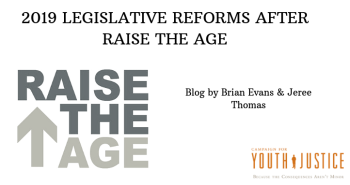2019 Legislative Reforms After Raise the Age

Since 2016, five states, Louisiana, South Carolina, New York, North Carolina, and Missouri, have passed laws to raise the age of juvenile court jurisdiction to age eighteen. Now, only four states remain with lower ages of juvenile court jurisdiction without laws to raise the age in the near future. Michigan’s legislature recently passed bill packages in the House and the Senate to raise the age.
Michigan’s legislature recently passed bill packages in the House and the Senate to raise the age. Once reconciled and signed by Governor Whitmer, Michigan will join the five states listed above that are currently preparing to fully implement their laws. This will leave Wisconsin, Texas, and Georgia as the final three states that still automatically treat all of their seventeen-year-olds as adults simply because of their age.
According to the Justice policy Institute, ,historically states that have raised the age have utilized the opportunity to pass additional reforms to rightsize their juvenile justice system. This legislative session, the states preparing to implement their raise the age laws are following a similar path. Here are a few of the legislative reforms introduced this year to support the successful implementation of their raise the age laws.
Jail Removal
- North Carolina’s Raise the Age Modification bills HB 609 and SB 413 will, among other things, keep youth under eighteen out of adult jails if enacted.
- South Carolina has two resolutions proposing to amend the SC constitution to make it clear that youth under eighteen should be held separately from adults. If passed, the question of amending the constitution would be placed on the ballot during the next election (SJR 46/ HJR 3540).
Limiting Detention
- For the past several sessions, members of the Joint Citizens and Legislative Committee on Children in South Carolina have proposed bills to limit the detention of status offenders which would help create capacity to serve seventeen-year-old youth. (SB 22/ HB 3297).
- In New York, the FY 2020 budget includes a provision ending the detention of children classified as “Persons in Need of Supervision” (PINS).
- In Louisiana, HB 11, would give police officers the ability to release a seventeen-year-old charged with a misdemeanor offense after issuing a summons or getting a child’s written agreement to appear in court. This would allow a child to be released and not detained. Under current law, children are detained until they can be released to their parents. In addition, there is another bill, HB 158, to limit the placement of youth in detention to youth charged with serious offenses or with a history of adjudications for serious offenses. It also requires that by July 1, 2020, status offenders are not placed in detention unless a detention screening instrument is used that indicates that detention is appropriate.
Raising the Minimum Age of Juvenile Delinquency
- North Carolina is looking to raise the minimum age of juvenile delinquency from six to ten-years-old. (HB 347).
- In New York, there is a push from advocates to end the prosecution of children under age twelve in the juvenile system.
Record Expungement & Sealing
- North Carolina has several bills pending to expunge the records of sixteen and seventeen-year-olds who were charged as adults before enactment of the Raise the Age law (HB 121, SB 614, SB 562)
- In New York, there are also several pieces of legislation designed to allow more record sealing, both for young adults ages nineteen through twenty-five (the “Juvenile Offender Second Chance Act”), and for those sixteen and seventeen-year-olds prosecuted before they were covered by the Raise the Age law (A5027).
Implementation Committees
- In Missouri, HB 953 would establish an “Interim Joint Committee on Juvenile Court Jurisdiction and Implementation” that would study and report on by January 15, 2020, what the state would need to do to ensure successful implementation of its raise the age law.
Additional Protections for Youth
- In Missouri, HB 42 / SB 395 would make it more difficult for children to waive their right to counsel, thus ensuring greater protection of their rights during judicial proceedings.
We are incredibly proud of our state partners for championing the passage and now the implementation of Raise the Age in their states. While the number of youth prosecuted as adults due to lower ages of criminal responsibility has decreased from 190,000 in 2007 to 76,000 in 2017; once the reforms in the second “tier” of raise the age states are enacted, we expect this number to be halved again as a result of their efforts. As this legislation indicates, passing raise the age is an opportunity for further reform to rightsize the juvenile justice system and improve long-term outcomes for youth.

